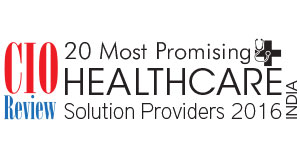 Agfa-Gevaert, headquartered in Belgium with its India office in Mumbai, is one of the leading organizations in the market of digital imaging systems and IT solutions.
Agfa-Gevaert, headquartered in Belgium with its India office in Mumbai, is one of the leading organizations in the market of digital imaging systems and IT solutions.Agfa HealthCare is one of its business groups. As an integral part of Agfa HealthCare's IT portfolio, Business Intelligence plays an important role by enabling healthcare providers to gather, organize, analyze and manage clinical, quality, financial and administrative data, ultimately supporting better decision-making.
It is no surprise that business Intelligence is fast growing in the healthcare industry with the increased use of electronic health records (EHRs) and the general increase in data volumes. In order to organize clinical, business and operational data, the three categories that the healthcare organizations are interested in, for decision making purposes, application of business intelligence is a must. It is believed that 95 percent of providers are projected to adopt electronic health records (EHRs) by 2020, while data is expected to grow 48 percent each year by that time. Thus healthcare BI technology is expected to grow even more. But organizations are not entirely tackling their wealth of data or perhaps there is the lack of a documented BI strategy or use of a poorly developed one. Although healthcare establishments are generating a lot of data but the information obtained is very less. Many health systems are still trying to settle on an approach.
Agfa HealthCare's Business Intelligence tool is a browser-based solution that presents data gathered from the database using a fixed set of predefined, non-editable Management reports and a Dashboard created by Agfa. The Dashboard offers real-time insight into the departmental operations allowing decision makers to respond quickly to problems, while the Reports provide information on resource utilization and performance.
Benefits of Business Intelligence
Agfa Healthcare allows the user to easily access reports and dashboards via the Web. The users can create/author their own tailored reports with Ad-hoc reporting. It helps maximize performance and source integrity through an independent reporting database. One can also rely on Agfa's knowledgeable consulting team to assist you if the need arises.
Healthcare made Accessible
Healthcare efficiency now includes the quality of care and consumer satisfaction in its definition. Within the changing healthcare environment the responsibility is strongly on diagnosticians to not only interpret studies with a high degree of quality and accuracy, but to also add value by being available to consult with other physicians to explain and clarify findings, and even communicate and assist at the patient level with both individuals and their families Care delivery is no longer a single physician exercise. Dynamically built teams of care givers deliver integrated care to patients in need. These physicians need to exchange imaging and multimedia information to enable collaboration on patient care.
Agfa HealthCare has developed a universal Enterprise (XERO) Viewer. It is a zero footprint, browser-based platform that offers fast and secure access to patient images and reports regardless of location or origin. Within XERO Viewer there is a native study sharing functionality that allows an authorized user to share a patient's image, study or entire record with another authenticated user, or device. This includes the ability to send a secured web link using an email client, a QR code (mobile device barcode), or by copying the text-based link into another application or browser. Level of security and duration of access can be determined by the site
at implementation.
Agfa HealthCare Enterprise Imaging provides the services that allow healthcare organizations to reduce maintenance costs across multiple departments through consolidated enterprise exchange, viewing, capture, workflow, management, and departmental services; improving the efficiency and quality of care.
Managed Cloud Services
Agfa HC IT Solutions have evolved over time leveraging the latest technology which makes it cloud ready. This has given Agfa an early start to launch this business model under Managed Services. This has got high recognition and has eventually resulted in benefiting clinicians to get their results which in-turn contributes to Patient care. Agfa helps their clients address the departmental and enterprise challenge of medical image and report management, storage, retrieval and distribution which in return saves time and cost. But the key diver is Optimizing Total Cost of Ownership (TCO) through economies of scale, and by replacing large capital purchases with operational expenditures. Agfa HealthCare's Managed and Cloud Services perform the day-to-day monitoring and management, maintenance, updates and support of your system. It also helps protect the confidentiality, integrity, and availability of patient data which facilitate staff efficiency, ultimately increasing both staff and patient satisfaction.
Suresh Ranganathan, General Manager of Agfa HealthCare India and ASEAN, interprets the future of the healthcare industry, "In the future, the need will arise for a single converged platform strategy which provides multi-departmental informatics, PACS and imaging services, VNA, image exchange, mobile display and acquisition, physician collaboration, patient engagement, foreign study management, and regional health services, on a single
converged platform."
at implementation.
Agfa HealthCare Enterprise Imaging provides the services that allow healthcare organizations to reduce maintenance costs across multiple departments through consolidated enterprise exchange, viewing, capture, workflow, management, and departmental services; improving the efficiency and quality of care.
Managed Cloud Services
Agfa HC IT Solutions have evolved over time leveraging the latest technology which makes it cloud ready. This has given Agfa an early start to launch this business model under Managed Services. This has got high recognition and has eventually resulted in benefiting clinicians to get their results which in-turn contributes to Patient care. Agfa helps their clients address the departmental and enterprise challenge of medical image and report management, storage, retrieval and distribution which in return saves time and cost. But the key diver is Optimizing Total Cost of Ownership (TCO) through economies of scale, and by replacing large capital purchases with operational expenditures. Agfa HealthCare's Managed and Cloud Services perform the day-to-day monitoring and management, maintenance, updates and support of your system. It also helps protect the confidentiality, integrity, and availability of patient data which facilitate staff efficiency, ultimately increasing both staff and patient satisfaction.

Agfa HealthCare Enterprise Imaging provides the services that allow healthcare organizations to reduce maintenance costs
Suresh Ranganathan, General Manager of Agfa HealthCare India and ASEAN, interprets the future of the healthcare industry, "In the future, the need will arise for a single converged platform strategy which provides multi-departmental informatics, PACS and imaging services, VNA, image exchange, mobile display and acquisition, physician collaboration, patient engagement, foreign study management, and regional health services, on a single
converged platform."





